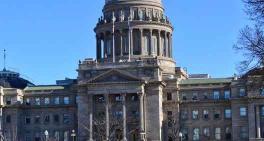Trump made lasting impact on federal courts
Legal Compliance
On this, even President Donald Trump’s most fevered critics agree: he has left a deep imprint on the federal courts that will outlast his one term in office for decades to come.
He used the promise of conservative judicial appointments to win over Republican skeptics as a candidate. Then as president, he relied on outside conservative legal organizations and Senate Majority Leader Mitch McConnell to employ an assembly line-like precision to install more than 230 judges on the federal bench, including the three newest justices of the Supreme Court. Trump never tired of boasting about it.
Indeed, undeterred by Democratic criticism, the Senate was still confirming judges more than a month after Trump lost his reelection bid to Joe Biden.
“Trump has basically done more than any president has done in a single term since (President Jimmy) Carter to put his stamp on the judiciary,” said Jonathan Adler, a law professor at Case Western Reserve University School of Law in Cleveland, Ohio, adding that Congress created around 150 new judgeships during Carter’s presidency.
The impact will be enduring. Among the Trump-appointed judges, who hold lifetime positions, several are still in their 30s. The three Supreme Court picks could still be on the court at the 21st century’s midpoint, 30 years from now.
Beyond the Supreme Court, 30 percent of the judges on the nation’s court of appeals, where all but a handful of cases reach their end, were appointed by Trump.
But numbers don’t tell the entire story. The real measure of what Trump has been able to do will be revealed in countless court decisions in the years to come on abortion, guns, religious rights and a host of other culture wars issues.
When it came to the president’s own legal challenges of the election results, however, judges who have him to thank for their position rebuffed his claims. But in many other important ways, his success with judicial appointments already is paying dividends for conservatives.
When the Supreme Court blocked New York from enforcing certain limits on attendance at churches and synagogues in areas designated as hard hit by COVID-19, Justice Amy Coney Barrett, the newest member of the court, cast the decisive fifth vote. Previously, the court had allowed restrictions on religious services over the dissent of four justices, including the other two Trump nominees, Neil Gorsuch and Brett Kavanaugh.
Five Trump appointees were in the majority of the 6-4 decision by the full 11th U.S. Circuit Court of Appeals in September that made it harder for felons in Florida to regain the right to vote. The Atlanta-based court had a majority of Democratic-appointed judges when Trump took office.
Related listings
-
Trump plan to curb drug costs dealt setback in court
Legal Compliance 12/24/2020A late-term maneuver by President Donald Trump to use lower drug prices paid overseas to limit some of Medicare’s own costs suffered a legal setback Wednesday that appears likely to keep the policy from taking effect before the president leaves...
-
Senate confirms Barrett replacement on federal appeals court
Legal Compliance 12/17/2020The Senate has confirmed an Indiana prosecutor to replace Supreme Court Justice Amy Coney Barrett on a federal appeals court based in Chicago.Thomas Kirsch, who currently serves as U.S. Attorney for the Northern District of Indiana, will replace Barr...
-
High court to decide whether Nazi art case stays in US court
Legal Compliance 12/06/2020Jed Leiber was an adult before he learned that his family was once part-owner of a collection of centuries-old religious artworks now said to be worth at least $250 million.Over a steak dinner at a New York City restaurant in the 1990s he had asked h...




